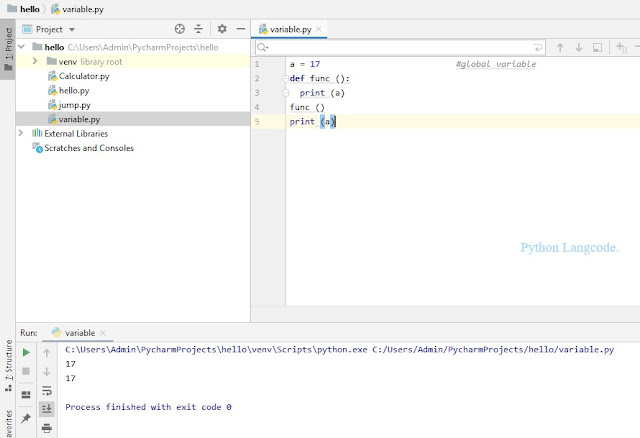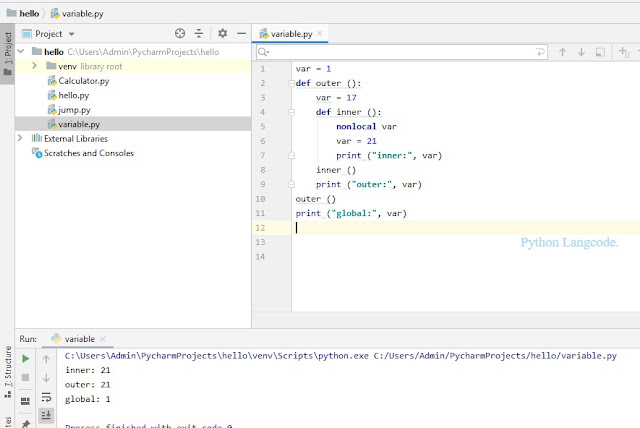What is Variable?
The memory location is reserved to store the value by the interpreter when a variable is created.The value of any data type can be stored on the variable. For example, Number, string, list, tuple, dictionary
Assigning Value to Variable
The declaration is not required in Python. Declaration occurs automatically when the value is assigned to the variable.Python does not have a default value of variable due to a lack of declaration.
For example:-
Source code:
a = 10 #Number
b = "Hello" #string
c = [1,17,21] #list
print (a, b, c)
 |
| Assigning a value to the variable |
Output:
Changing Variable's Value
The value of the variable can be changed or re-assigned in Python.Source Code:
a = 10
print (a)
b = "Hello"
print (b)
c = [1,17,21]
print (c)
5
Hello
[1,17,21]
Source Code:
a = b = c = d = "Hello"
 |
| changing variables value |
Output:-
5
Hello
[1,17,21]
Assigning Single Value to Multiple Variables
In Python, the same value can be assigned to more than one variable.Source Code:
a = b = c = d = "Hello"
print (a)
print (b)
print (c)
print(d)
 |
| Assigning a single value to multiple variables |
Output:
Hello
Hello
Hello
Hello
Assigning Value to Variable according to order
Value is stored on the variable in Python in order.For example, the same memory location multiple variables and their values are assigned.
Source Code:
a, b, c = 1, 'Hello', [1, 17]
print (a)
print (b)
print (c)
Output:
1
Hello
[1, 17]
Variables Concatenation
In Python, variables of the same data types can be concatenated.
On the example:-
str () function has been used to convert the object from integer to string.
Source Code:
a = 1
b = 17
print (a + b)
print (str (a) + str (b))
c = "Hello"
print (str (a) + c)
 |
| Assigning a value to variables according to order |
Output:
1
Hello
[1, 17]
Variables Concatenation
In Python, variables of the same data types can be concatenated.
On the example:-
str () function has been used to convert the object from integer to string.
Source Code:
a = 1
b = 17
print (a + b)
print (str (a) + str (b))
c = "Hello"
print (str (a) + c)
 |
| Variable concatenation |
Output:
18
17
1Hello
Types of Variables
There are two types of variables in Python.- Local Variables
- Global Variables
1. Local Variables
Local Variables; are inside functions. Their visibility is only inside the function, when they come out of the function, then they are destroyed.
Source Code:
def func ():
a = 17 #local variable
print (a)
print (a)
func ()
print(a)
Output:
17
Traceback (most recent call last):
print (a)
NameError: name 'a' is not defined
2. Global Variables
Global Variables; are outside the function. Their visibility is in and out of function. Their scope is on the whole program.
a = 17 #global variable
print(a)
 |
| Local variable |
17
Traceback (most recent call last):
print (a)
NameError: name 'a' is not defined
2. Global Variables
Global Variables; are outside the function. Their visibility is in and out of function. Their scope is on the whole program.
a = 17 #global variable
def func ():
print (a)
func ()
print (a)
Output:
17
17
Both local and global variables are declared on the example:
The variable outside the function is global and the variable inside is local. The scope of the global variable is in and out of the function, but due to a separate variable declaration inside the function, the value of the variable changes as soon as calling func ().
Source Code:
a = 17 #global variable
def func ():
 |
| global variable |
Output:
17
17
Both local and global variables are declared on the example:
The variable outside the function is global and the variable inside is local. The scope of the global variable is in and out of the function, but due to a separate variable declaration inside the function, the value of the variable changes as soon as calling func ().
Source Code:
a = 17 #global variable
def func ():
print (a)
func ()
print (a)
1
17
On the example, the 'a' variable has been printed before the declaration of 'a' variable, due to this the exception 'UnboundLocalError' has occurred.
Source Code:
def func ():
 |
| declare variable |
Output:
1
17
With 'global' and without 'global' Keyword
The keyword 'global' is also used for the variable in the function.- Without global
On the example, the 'a' variable has been printed before the declaration of 'a' variable, due to this the exception 'UnboundLocalError' has occurred.
Source Code:
def func ():
print (a)
a = "local"
print (a)
a = "global"
func ()
print (a)
in func
print (a)
UnboundLocalError: local variable 'a' referenced before assignment
On the example, the global keyword has been used in the beginning and after that variable a has been printed. Wherever in the program, there will be a global variable named 'a', it will be printed first as soon as calling func ().
Source Code:
def func ():
 |
| without global |
Output:in func
print (a)
UnboundLocalError: local variable 'a' referenced before assignment
- With global
On the example, the global keyword has been used in the beginning and after that variable a has been printed. Wherever in the program, there will be a global variable named 'a', it will be printed first as soon as calling func ().
Source Code:
def func ():
global a
print (a) #print global
a = "Hello"
print (a) #print local
a = "Everyone"
func ()
print (a) #print local
Everyone
Hello
Hello
Source Code:
var = 1
def outer ():
var = 17
def inner ():
var = 21
print ("inner:", var)
inner ()
print ("outer:", var)
outer ()
print ("global:", var)
var = 1
 |
| with global |
Output:Everyone
Hello
Hello
No-Local or No-Global Variable
The 'nonlocal' variable is used for nested function. The 'nonlocal' variables are not even global and are not global either. If they are taken in the inner function, then their values in the outer functions do not change.- Without nonlocal
Source Code:
var = 1
def outer ():
var = 17
def inner ():
var = 21
print ("inner:", var)
inner ()
print ("outer:", var)
outer ()
print ("global:", var)
 |
| without nolocal |
Output:
inner: 21
outer: 17
global: 1
- With nonlocal
var = 1
def outer ():
var = 17
def inner ():
nonlocal var
var = 21
print ("inner:", var)
inner ()
print ("outer:", var)
outer ()


0 Comments